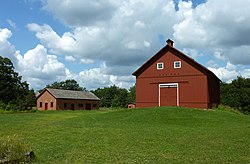North Oaks, Minnesota
| North Oaks, Minnesota | |
|---|---|
| City | |

The remaining buildings of North Oaks Farm are preserved by the city.
|
|
 Location of the city of North Oaks within Ramsey County, Minnesota |
|
| Coordinates: 45°5′29″N 93°5′26″W / 45.09139°N 93.09056°W | |
| Country | United States |
| State | Minnesota |
| County | Ramsey |
| Area | |
| • Total | 8.63 sq mi (22.35 km2) |
| • Land | 6.92 sq mi (17.92 km2) |
| • Water | 1.71 sq mi (4.43 km2) |
| Elevation | 938 ft (286 m) |
| Population (2010) | |
| • Total | 4,469 |
| • Estimate (2012) | 4,575 |
| • Density | 645.8/sq mi (249.3/km2) |
| Time zone | Central (CST) (UTC-6) |
| • Summer (DST) | CDT (UTC-5) |
| ZIP codes | 55126, 55127 |
| Area code(s) | 651 |
| FIPS code | 27-47104 |
| GNIS feature ID | 0648674 |
North Oaks is an affluent suburb 10 miles (16 km) north of Saint Paul in Ramsey County in the U.S. state of Minnesota. The population was 4,469 at the 2010 census.
Formerly a gated community that now posts private access signage, all land is owned by homeowners with the North Oaks Home Owners Association maintaining all roads, plowing, parks, facilities, and recreation trails. Each homeowner's property extends halfway into the street. There is also a city government with a Mayor and City Council that administers basic services such as fire, police, planning, and licensing. The city owns no property. The Metropolitan Council has jurisdiction over the city's comprehensive plan within Minneapolis-Saint Paul, the sixteenth largest metropolitan area in the United States.
Structured around Pleasant Lake, the area began as a water source for the Saint Paul municipal water system, which still maintains water access rights today. The land was later purchased by Saint Paul magnate James J. Hill in 1883 and expanded into a 5,000-acre (20 km2) breeding and hobby farm.
His son Louis Hill later owned North Oaks Farm until death in 1950. Ownership passed to Louis' children who decided to develop the land into a model residential community. They incorporated the North Oaks Company with a mission to build with respect for the natural environment, having witnessed metropolitan sprawl during this time. To ensure their mission would be fulfilled, land was subdivided and sold with a warranty deed that created the North Oaks Home Owners’ Association (NOHOA) to be responsible for roads and recreation. Each deed placed each home's property line halfway into the street, placing all roads into private ownership.
Remaining land in the city is owned by the North Oaks Company. The original farm buildings have been restored and are viewable to the public along with informational displays; tours are also available. Two of the remaining structures, the Blacksmith Shop and Machine Shop and Dairy Building, are listed on the National Register of Historic Places.
...
Wikipedia
